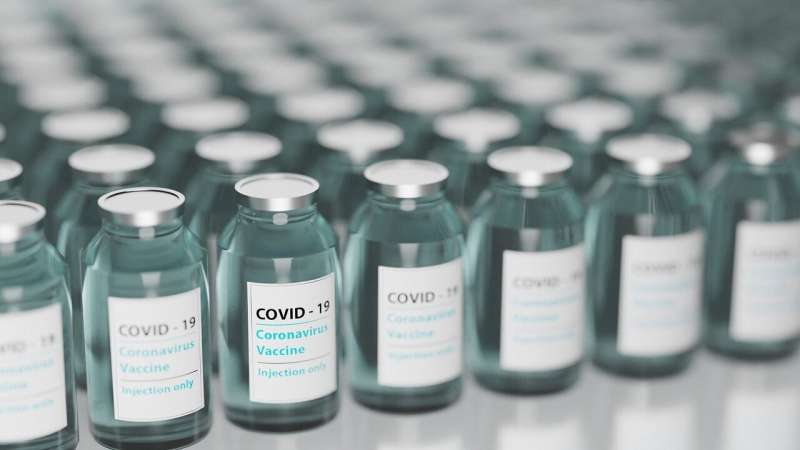Credit: Pixabay/CC0 Public Domain
Discussion of COVID-19 vaccines dominates the news: Who will have access? When will they receive their shots? What's the difference between Pfizer and Moderna vaccines? But the topic seldom turns to costs and who will eventually own the rights to these critical technologies.
It's a conversation that should be happening, says Dr. Reshma Ramachandran, a physician-fellow in the Yale National Clinicians Scholars Program. In her research with Yale colleagues—including Jason Schwartz at Yale School of Public Health; Dr. Joseph Ross, professor of medicine; and Meera Dhodapkar, a third-year medical student at Yale —she has found that the cost of flu vaccine prices has outpaced the prices of prescription drugs, driving up costs for the public and private sectors alike.
There's every reason to expect a similar trajectory will play out with the COVID-19 vaccines, said Ramachandran, who last week testified before U.S. lawmakers about vaccine pricing, taxpayer funding, and the refusal of the government and drug manufacturers to reveal information about the arrangements they've reached around these technologies.
In an interview with YaleNews, she discussed the need for transparency about these government-manufacturer agreements, who will control the intellectual rights to the technologies, and how this will ultimately affect public budgets and health care costs.
Dr. Reshma Ramachandran. Credit: Yale University
The conversation has been condensed and edited.
YaleNews: How much do we know about how dollars are being spent in developing these vaccines and the agreements in place between the government and pharmaceutical companies?
Reshma Ramachandran: Multiple consumer advocacy organizations and news outlets have requested these agreements through Freedom of Information Act requests, and they've either been ignored or there have been many months of delays. This has led to a number of lawsuits seeking the release of these contracts. When we've had access to the agreements, a lot of the pages have been redacted.
Take the Moderna vaccine, which was fully funded by taxpayer dollars, both in development and manufacturing, and resulted in advance purchase agreements. We received the 53-page agreement and only 14 pages were left unredacted. There is a lack of clarity around who owns the technology, whether or not the government will have rights to the manufacturing facilities we're hoping to build, and what this means for the not-so-distant future when it is anticipated that we will need booster vaccine doses against variants, as well.
Why does so much of this information remain secret?
Ramachandran: With the prior administration, there were concerns around conflicts of interest between administration officials and the companies that they were allocating money to. There was a recent news article that found that Operation Warp Speed [the Trump Administration's COVID-19 response plan] had taken some funds from a specific line item that was meant for hospitals and health care providers affected by COVID-19—around $10 billion—and awarded it to companies for developing these vaccines. People are asking for these agreements to be made public, but the Biden administration has been silent.
During your congressional testimony, you talked about the Taxpayer Research and Coronavirus Knowledge, or TRACK Act. How might that be part of the solution?
Ramachandran: The TRACK Act was just introduced this past week by Representative Lloyd Doggett (D-TX) and senators Jeff Merkley (D-OH) and Mike Braun (R-IN) and it has bipartisan support. Both sides agree that there should be transparency about how our taxpayer dollars are being spent and the terms. The idea is to have a user-friendly, publicly available database showing both the agreements as well as all public funds across agencies so we can know what mechanisms are available to us under these agreements to actually lay claim on the technology. We want to know who owns the intellectual property and who has rights to the production knowledge for manufacturing so that we can share that with other companies to further ramp up supply.
What might be the implications for vaccine prices in subsequent rounds if there are no adequate consumer protections in place?
Ramachandran: Pfizer told their investors recently that as soon as next year [when booster vaccinations will be required] they're going to be moving away from "pandemic pricing" and towards price points that are on par with other vaccines that they have on the market, at $150 or $175 per dose. When insurance companies have to shoulder this cost, they're going to pass it down to us through our insurance premiums.
This also has implications for the federal government when it purchases these vaccines for those patients with public plans. Every dollar that is spent on COVID-19 vaccines is another dollar that they won't be able to spend on repairing our public health infrastructure or the economy after the pandemic.
This is what we've seen historically with flu vaccines: a publicly funded vaccine technology has continued to increase in price over the past two decades with significant impacts on our public health program budgets and our insurance premiums.
How much have Moderna and other companies received as part of these vaccine agreements?
Ramachandran: Moderna received just over $3 billion from Operation Warp Speed. But even before the pandemic began, the NIH [National Institutes of Health] spent around $700 million on coronavirus research based on what was found in one of their databases (NIH RePORTER). As part of this initial research, NIH scientists developed a method for stabilizing coronavirus spike proteins that is used across multiple vaccine candidates. At the beginning of the pandemic, the NIH also created a public-private partnership with a number of these companies to allow them easy access to their clinical trial recruitment tools, their scientists, and other resources. And NIH fully funded, designed, and conducted Moderna's Phase 3 trials that led to its authorization.
Is there a growing demand for transparency?
Ramachandran: My patients often ask me when they will receive a vaccine and there continues to be concerns around whether or not we have an adequate supply of vaccines given the continued delays in production. Also, as state health officials have had to make difficult decisions to prioritize populations for the vaccine rollout due to limited supply, we're also seeing some communities being left behind—especially communities of color that have suffered far worse from COVID-19 and often may not have the same protections of being able to work from home to prevent contracting the disease while they wait for a vaccine.
Right now, the U.S. government needs to do everything in its power to take control of the supply. The Biden administration did step in for the recently authorized Janssen vaccine [from Johnson & Johnson], brokering a deal to share their vaccine technology with Merck to increase supply. This was made possible again with taxpayer funds—$269 million was awarded to Merck for manufacturing. At the same time, we're also trying to educate folks. It's not the companies that have taken on the risk of developing and manufacturing vaccines. It's the American people. We need to make sure that we get a fair return on our investment, both now and in the future.
Provided by Yale University

























